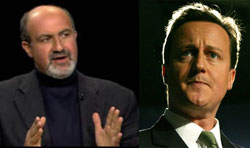 Yesterday, The Observer in London, printed this open letter from Black Swan Author Nassim Nicholas Taleb that he wrote to Conservative Leader David Cameron urging him NOT to follow in the path of the United States.
Yesterday, The Observer in London, printed this open letter from Black Swan Author Nassim Nicholas Taleb that he wrote to Conservative Leader David Cameron urging him NOT to follow in the path of the United States.
Taleb is keeping his eye on the ball that is debt. He sees the risk inherent with our disastrous policies and is issuing a warning. I agree 100% with Taleb, and am likewise very disappointed in the current administration – definitely an opportunity for real change has been lost and the problems simply compounded, nothing solved… (highlighting is mine)
Dear David (if I may),
You and your party may be the only hope we have for a resilient society insulated from negative Black Swans and in which everyone has the opportunity to benefit from positive Black Swans. For I despair of the Obama administration’s ability to fix this financial crisis and prevent future ones. I am appalled by the dangers it has been creating and its takeover by the same economic establishment responsible for this crisis.
What is a Black Swan? It is a low-probability, high-impact event that, because of its rarity and the instability of the environment, cannot be scientifically evaluated in terms of risk and return. Although Black Swans are rarely predicted, they are retrospectively seen as having been anticipated, which makes us overestimate our abilities to see them coming. Black Swans can emerge as a result of our intellectual arrogance and our ignorance of our limitations. Some elements of the future are simply beyond our grasp.
Much of history has been dominated by Black Swans, both positive and negative. These deviations are the main reason economic theories and forecasts do not work, since the exceptional and unforeseen high-impact event plays a large role in economic life.
We live in an increasingly complex system and complexity causes Black Swans. How? The more interdependent we become, the harder it is to trace the cause of an event and the tougher to forecast accurately, meaning the traditional tools of economics will fail us. And since the spread of the internet, rumours go round the world in minutes. Consider the run on Icelandic banks. It took place at BlackBerry speed. So the economic variables, such as sales, commodity prices, unemployment or GDP growth, are subject to ever more extreme variations. The over-efficiency of the systems means things run smoothly, but are subject to rare but violent blow-ups.
David, you must counter this complexity by lowering indebtedness. We have known since Babylonian times that debt is treacherous and allows no room for mistakes: felix qui nihil debet goes the Roman proverb (“happy is he who owes nothing”). The combination of debt levels swollen from two decades of over-confidence with modern finance’s complex derivatives has been disastrous.
Be careful, too, of the so-called science of economics. Economists have been no better in their predictions than cab drivers. We have an “expert” problem, in which the expert provides you with misplaced confidence, but no information. Because we think, correctly, that the dermatologist, the baker, the chemist are true experts (they know more about their respective subjects than the rest of us), we swallow the canard that the economists at the International Monetary Fund, the World Bank, the Bank of England and the US Federal Reserve are also experts, without checking their record. This reliance on faux experts is, for the most part, what got us here. Now it is continuing with the build-up of government deficit and an increased reliance on flimsy forecasts by the Obama administration.
This problem with experts was particularly acute when it came to the “risk models” on which bankers built those positions that turned sour. So it is that you are coming under pressure to provide more regulation. Alas, the need for more regulation is a myth. I have been fighting risk models both as a Wall Street trader and as a professor and my worst nightmares were the results of regulators. It was they who promoted the reliance on ratings by credit agencies. The “value-at-risk” models regulators promoted made us take more risks.
Damn straight, Nassim, damn straight! I would suggest that people forward Nassim’s letter to the White House, but I know exactly where it will land – upon deaf ears by those who derive their living from the “generosity” of the central bank.
- Bulenox: Get 45% to 91% OFF ... Use Discount Code: UNO
- Risk Our Money Not Yours | Get 50% to 90% OFF ... Use Discount Code: MMBVBKSM
Disclaimer: This page contains affiliate links. If you choose to make a purchase after clicking a link, we may receive a commission at no additional cost to you. Thank you for your support!


Leave a Reply